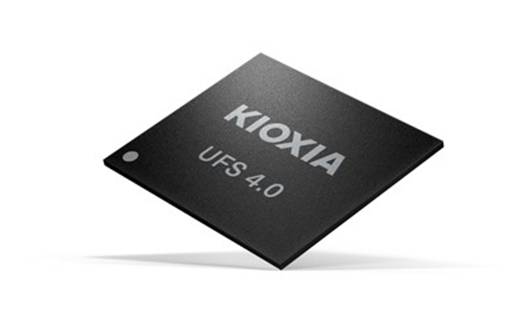Kioxia Launches a New Generation UFS Ver.4.0 Device
2023-06-05
With the newly launched 256GB, 512GB, and 1TB devices, smartphones and mobile applications can fully utilize 5G networks
Continuing to promote the development of Universal Flash Storage Technology (UFS), Kioxia Corporation is a leading global storage solution provider, announcing the launch of a new generation of high-performance UFS Ver. 4.0 embedded flash storage devices and has begun sample production. These devices come in small packages that provide fast built-in storage transfer speeds and are optimized for various next-generation mobile applications, including state-of-the-art smartphones. Kioxia UFS products bring more efficient performance, allowing these applications to fully utilize the benefits of 5G connectivity, achieving faster download speeds, reducing latency, and improving user experience.
 Kioxia: UFS Ver. 4.0 Embedded Flash Storage Device (photo: US Business News)
Kioxia: UFS Ver. 4.0 Embedded Flash Storage Device (photo: US Business News)
Kioxia's UFS Ver. 4.0 device brings the company's innovative BiCS FLASH ™ The 3D flash memory and controller are integrated in JEDEC standard packaging. This device adopts MIPI M-PHY 5.0 and UniPro 2.0 technology, supporting theoretical interface speeds of up to 23.2GB/s per channel or 46.4GB/s per device. In addition, UFS 4.0 is also backward compatible with UFS 3.1.
The main features include:
·Compared to the previous generation product [3], the performance has improved: an 18% increase in sequential write speed, a 30% increase in random write speed, and a 13% increase in random read speed
·Support for high-speed link initiation sequence (HS-LSS) function: When using traditional UFS, the link initiation between the device and the host is performed on low-speed PWM-G1 (3-9MB/s [4]), while when using HS-LSS, it can be executed at a faster HS-G1 A rate (1248MB/s). Compared to traditional methods, it is expected that this will reduce link startup time by approximately 70%.
·Enhanced security: Utilize advanced RPMB (replay protected memory block) to read and write secure data faster, such as user credentials stored in the RPMB area, and use the RPMB cleanup function to ensure that discarded data is safely and quickly disinfected.
·Support for Extended Initializer ID (Ext-IID): Intended for use with Multi Loop Queuing (MCQ) on UFS 4.0 host controllers to improve random performance.
Related links:
Kioxia's UFS Ver. 4.0 Embedded Flash Storage Device Product Information
https://www.kioxia.com/en-jp/business/memory/mlc-nand/ufs4.html

